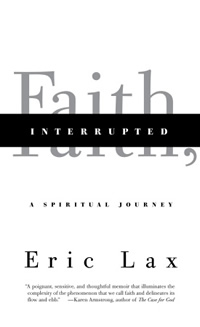Book Notes
 Eric Lax, Faith, Interrupted: A Spiritual Journey (New York: Knopf, 2010), 274pp.
Eric Lax, Faith, Interrupted: A Spiritual Journey (New York: Knopf, 2010), 274pp.
In the very first sentence of his memoir Nothing to Be Frightened Of (2009), Julian Barnes writes, "I don't believe in God, but I do miss him." Barnes came by his unbelief honestly — his father was an agnostic and his mother didn't believe "any of that [religious] mumbo jumbo." Eric Lax, best known for his several biographical books on Woody Allen, enjoyed a radically different religious heritage. He deeply loved and respected his father, an Episcopal priest, and served with relish and pride as an earnest acolyte from age eight through his college years. But in the very last sentence of his memoir, Lax ends up in the same spiritual space as Barnes. He no longer believes the faith of his father, but, he confesses, "I miss it."
Lax recalls a childhood that can only be called idyllic in the best sense of that word. He honored and adored his father. As a little boy he knelt by his bed for nightly prayers. Education was at an Episcopal school, and summers were spent at an Episcopal camp founded by his father. Lax's mother was likewise gracious, witty and devout. Lax cannot even imagine having had better parents, and of how fortunate he was to have them. These were years of a natural, sincere, and simple faith that Lax took to college in the fall of 1962. Even into his thirties he prayed regularly.
At college Lax met his roommate George Packard, a close friend of fifty years now, and much of his memoir recalls the asymmetrical paths that their lives took. These were the Vietnam years. Whereas Lax spent years arguing his case as a Conscientious Objector before the draft board and was willing to go to prison for his principled (and not merely expedient) beliefs, and then joined the Peace Corp for two years in Micronesia, Packard ended up in Vietnam on ambush and patrol. Packard entered the Episcopal priesthood after Vietnam, and eventually became a bishop, about the same time that Lax was experiencing a slow but certain drift from his unexamined childhood faith.
The death of his father meant the loss of his "conduit" and "anchor" to his faith, says Lax, and nineteen years later the death of his mother in 1995 meant that "I had no reason to fake faith and hide my doubts and concerns." Instead of reciting the Apostles' Creed and feeling like a hypocrite, he could now keep his uncomfortable silence. What's surprising about Lax's loss of faith, or at least his description of the loss, is that there's no acute crisis. And except for a single passing mention (p. 250), nor do any of the standard objections to faith like the problem of evil or the existence of other religions come into play. "When I was losing my faith," he writes, "it took some time for me to realize it. I wasn't looking to lose it; I just suddenly noticed there was a separation I had never known. I was like a car whose tires all have imperceptible leaks. Everything runs smoothly, until suddenly four flats bring you to a halt."
Lax admits that his doubts are hardly unfamiliar ones. He doesn't repudiate the multitude of priests and believers that he inherited from his family, but instead honors them. He's not even willing to say they are mistaken, but instead wonders if he himself is mistaken. "Although it is one of the seven deadly sins, I admire them." What Lax wishes he had was "what I'd always had, but the faith I had accepted without question and could articulate by catechetical rote could not be captured in reverse." Which raises an interesting question. What, exactly, is the difference between the childlike faith that Jesus commends and the childish faith that adults rightly outgrow?


